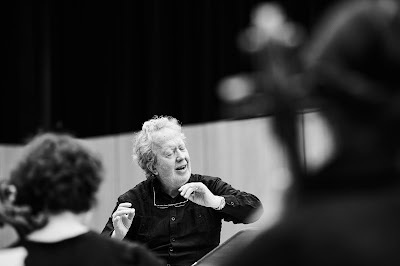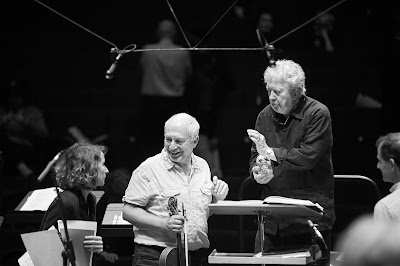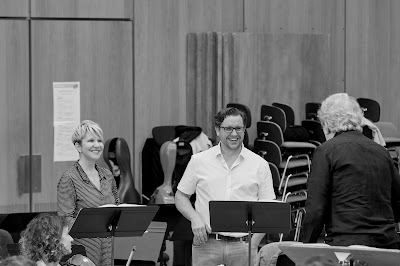 |
| John Nelson rehearsing Berlioz's Les Troyens (Photo Gregory Massat) |
The distinguished American conductor John Nelson has a wide repertoire, but is perhaps best known as a conductor of Berlioz' music. Having previous recording Berlioz' operas Benvenuto Cellini and Béatrice et Bénédict, Les nuits d'été and the Te Deum, Nelson's recording of Les Troyens has just been issued on the Erato label following recording at a pair of live concerts in Strasbourg with the Orchestre philharmonique de Strasbourg and a cast including Joyce DiDonato, Michael Spyres and Marie-Nicole Lemieux. I was luck enough to be able to interview John Nelson by email to talk about the new recording (see my review of Les Troyens) and his inspirations in his conducting career.
 |
| John Nelson (Photo Marco Borggreve) |
A bit of both. The Carnegie Hall concert version was deliberate- a project conceived by Matthew Epstein in 1972 to get my name on the map. The Met production two years later was a beautiful happenstance for which I was hired to assist Rafael Kubelik in the American premier of the staged opera. He fell ill after the second performance and I stepped into the pit with Christa Ludwig (Dido) and Jon Vickers (Aeneas) staring down at me! That success resulted in my being engaged to conduct the same work at the Grand Theatre in Geneva, Switzerland for my European debut.
Your recording of 'Les Troyens' was made from live performances, as was your recording of Berlioz's 'Benvenuto Cellini'. Is this a way of recording you prefer, or simply economic necessity?
It is what I prefer. All kinds of musical compromises occur when dealing with staging and sets. In a concert version one can concentrate on musical values. "Prima la musica!"
Every person in the audience can let his imagination fly rather than be limited to what one stage director and one set designer conceive. How can one think of Dido as queen of Carthage when she is portrayed as Angela Merkel as was done in one production I conducted! The recorded concert performances we just did in Strasbourg were met by thunderous applause every bit as vociferous if not more than any of the staged versions I've experienced.
 |
| John Nelson rehearsing Berlioz's Les Troyens (Photo Gregory Massat) |
Terribly important! I regard Les Troyens as the greatest opera in the French language.
Not only does the language cry out for French singers but the style of composition demands a French orchestra. We had both in Strasbourg and the whole rehearsal process went swimmingly as a result. The reviews that have already come out are all rather superlative and the principal reason I venture to say is the naturalness and beauty of the frenchness of it all. Even the non-French singers like Joyce and Michael sound like it's their native language because of brilliant coaching by our two French diction coaches.
Do you feel that our view of Berlioz's operatic output has changed over the years, and how do you feel your interpretation of the opera has developed since you first conducted it?
Prior to 50 years ago hardly anything of Berlioz' output was known other than the Symphonie Fantastique. With the publication of all his works by Baerenreiter, starting in 1969 with Les Troyens, Berlioz is now recognised as the quintessential Romantic composer. You cannot be a complete symphonic conductor without having a number of his works under your belt. As a result there has gradually been an increased comfort level with his highly iconoclastic style. Perhaps "comfort level" is not the appropriate term here as his music when done well should always sound uncomfortable, challenging and modern.
My interpretations of Berlioz, as with all composers, have changed over the years. That is only natural and essential. My first Les Troyens was interpreted by a novice. I shuddered when I listened to it ten years later. Now forty-five years later it has distilled like good wine. I'm so glad I waited till now to record it!
 |
| John Nelson rehearsing Berlioz's Les Troyens (Photo Gregory Massat) |
If there were one overriding challenge I would say it would be the choice of recording engineer. He must be someone who knows the score, who has an ear for balances, who speaks the language, who is knowledgeable of the myriad technicalities of recording, and perhaps most importantly someone who can create a calm atmosphere in which all performers can give of their best. That person for us was Daniel Zalay, the best in the business.
Do you listen to other recordings of works that you are performing. Do any of the recordings of Les Troyens from the past particularly speak to you?
I listen to as many recordings as I can find as there is so much to learn especially from the great conductors of the past. But if I listen too much to any given one I'm in danger of forfeiting my individuality. As for Les Troyens I have listened to all that is out there and been influenced by a lot of them but frankly more by what the singers bring to the music than conductors.
You have recorded a significant amount of Berlioz's music, what is it about the composer that appeals to you?
If there were one thing, I would say his passion and his intensity. Is there any music more passionate than the duet of Dido and Aeneas at the end of Act four or more intense than Dido's hurling venom towards Aeneas as he forsakes her in Act five? But there is so much more. His extravagance: twelve harps in the Te Deum, four brass bands in the Requiem. His story-telling: who else wrote his autobiographical story into a symphony?
His brilliant colouring: Beethoven used a maximum of twelve different instruments, Berlioz introduced a host of new instruments including the darker instruments like the English Horn and the Bass Clarinet.
 |
| Joyce DiDonato, Michael Spyres, John Nelson rehearsing Berlioz's Les Troyens (Photo Gregory Massat) |
I have three musical patron saints. Bach is first because he is simply the greatest composer that ever lived, Schumann because no composer warms my heart as he does, and Berlioz because I have been associated with him more than any other composer in my career. Why this particular affinity? As I said, his audacity, originality and white-heat intensity. There are lesser composers that can almost sound like Bach and Schumann but there is no one that sounds remotely like Berlioz. His sound world is all his own. Many of my colleagues find him inscrutable but my life long association with him has given me the privilege of understanding that world and giving myself completely to it.
Did you always want to be a conductor, how did you start on your career?
No, I was first of all a pianist and thought I should spend my life as a church musician. My parents were Protestant missionaries in Costa Rica. But I was stung by the conducting bug in high school when I went to a three-week music camp at Westminster Choir College where its famed founder and conductor, John Finley Williams, took a liking to me and said, "Young man, you've got talent. Do something with it!" His was the voice of God. Two years later I was a piano major at Wheaton College in Chicago and its choir director, Dr. Rolf Espeseth, took me under his wings with pretty much the same challenge. He prepared me for studies at the Juilliard School where I later studied conducting and received two masters degrees. Several years later Matthew Epstein, the management guru and good friend, proposed and organised the Carnegie Hall premiere of Les Troyens and my career took off.
 |
| John Nelson conducting Berlioz's Les Troyens with Joyce DiDonato, Michael Spyres, Orchestra philharmonique de Strasbourg (Photo Gregory Massat) |
George Szell and Carlo Maria Giulini- two very different maestros, one strict, tightly controlling and autocratic, the other warm and encouraging. To marry these two extremes has been my life-long challenge.
As a conductor, do you have a Desert Island work?
Unquestionably the St. Matthew Passion by Bach. It is the greatest story ever told written in the greatest musical language ever conceived by a human.
Is there a particular work you would love to conduct but have so far not done so?
At this late point in my career my main desire is to do better and better the repertoire that I know and love best. But there are many works I'd like to sink my teeth into such as Poulenc's Dialogues des Carmelites and Debussy's Pelleas et Melisande if time and circumstances permit.
'A reflection of 19th century style, and coruscating performances' - read my review of Les troyens
John Nelson on disc:
- Berlioz: Les troyens - Joyce DiDonato, Marie-Nicole Lemieux, Michael Spyres; available on Amazon
- Berlioz: Benvenuto Cellini - Gregory Kunde, Patrizia Ciofi, Joyce DiDonato; available on Amazon
- Berlioz: Te Deum - Roberto Alagna, Marie-Claire Alain, Choeur et orchestre de Paris; available on Amazon
- Berlioz: Béatrice et Bénédict - Susan Graham, Jean-Luc Viala, Sylvia McNair; available on Amazon
- Berlioz: Les nuits d'été - Susan Graham, Orchestra of the Royal Opera House; available on Amazon
- Handel: Semele - Kathleen Battle, Marilyn Horne, Samuel Ramey, John Aler; available on Amazon
- Handel & Bach arias - Stephanie Blythe, Ensemble Orchestral de Paris; available on Amazon
- Bach arias - Kathleen Battle, Itzhak Perlman, Orchestra of St Lukes; available on Amazon
- Contemporary carols in style: Suzi Digby & ORA launch their Advent Calendar - Concert review
- Teenage Mozart: Classical Opera's stylish account of Il sogno di Scipione - CD review
- Gargantuan: Mahler's Symphony No. 3 in Berlin - concert review
- Revolting rhymes & marvellous music: The Magnard Ensemble in Roald Dahl & Paul Patterson - Cd review
- Generously lyrical: A Houseman Dichterliebe from Gareth Brynmor John, Nigel Foster and Gabriel Woolf - concert review
- The man behind the music of War Horse: I chat to composer Adrian Sutton - interview
- Divine consolations: Stile Antico in Schütz and Bach - concert review
- Historical importance: Alamire in new Thomas Tallis discoveries - CD review
- Composers selection: Penderecki conducts Penderecki - CD review
- Audience participation & great fun: Schools version of Hansel & Gretel - music education
- Home

.jpg)









No comments:
Post a Comment